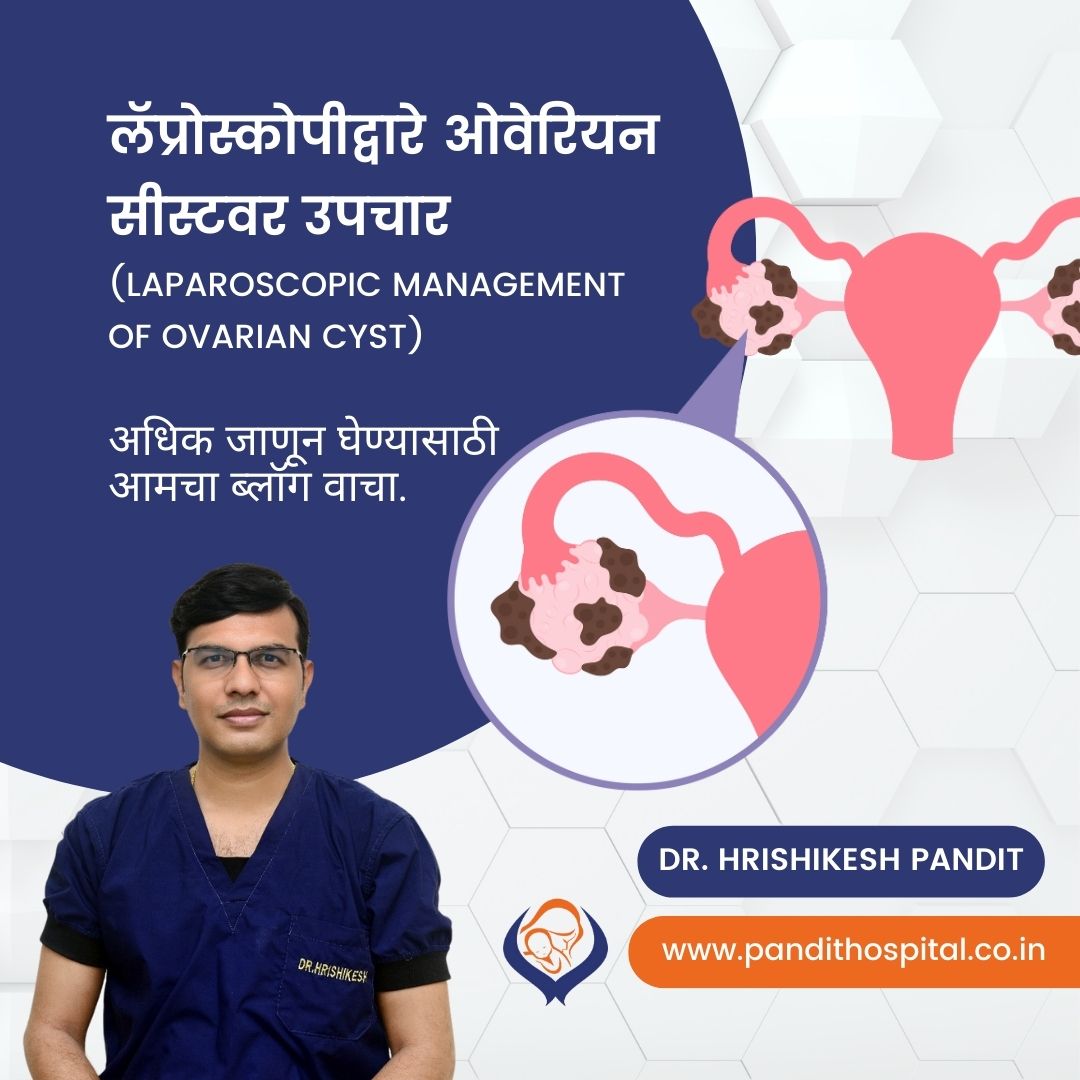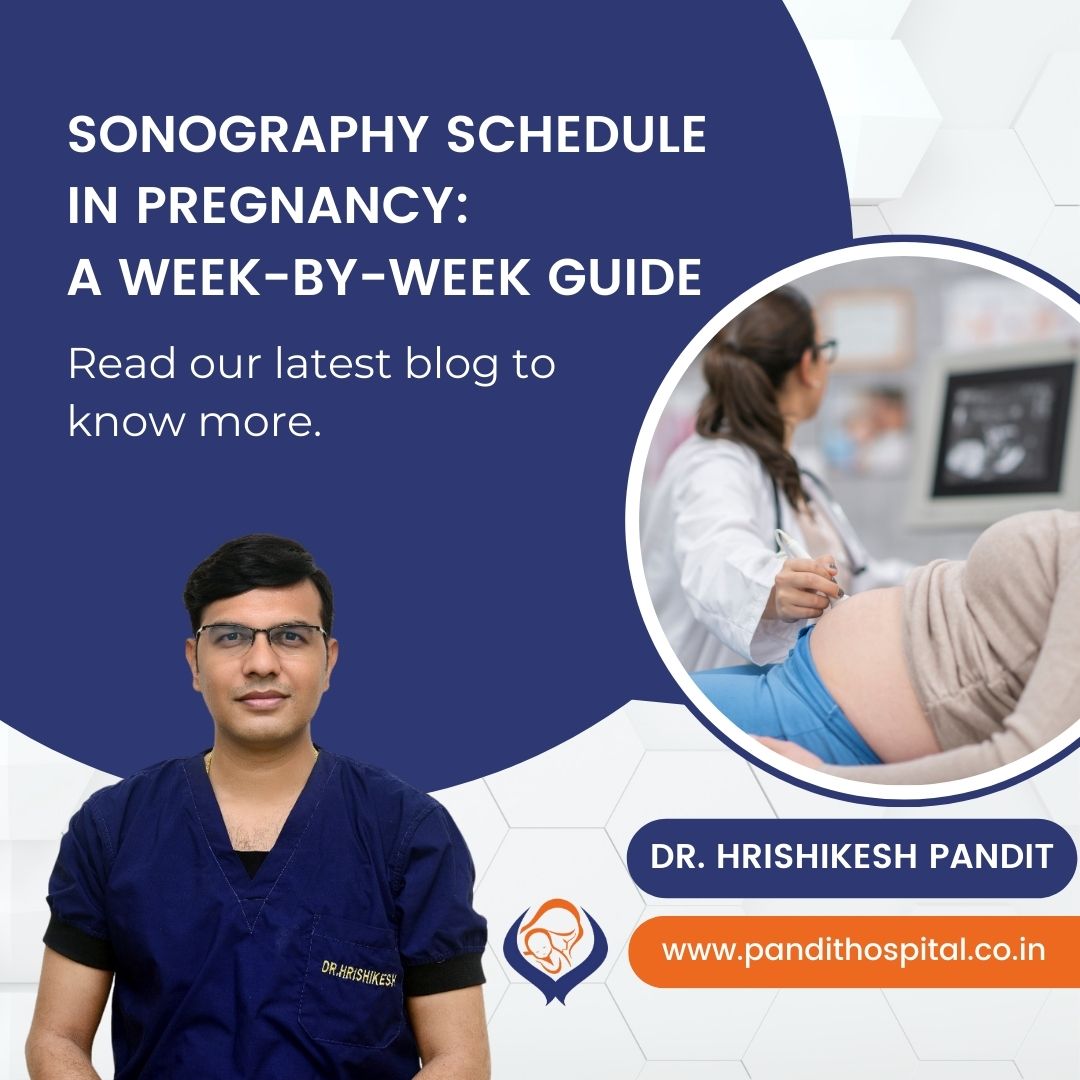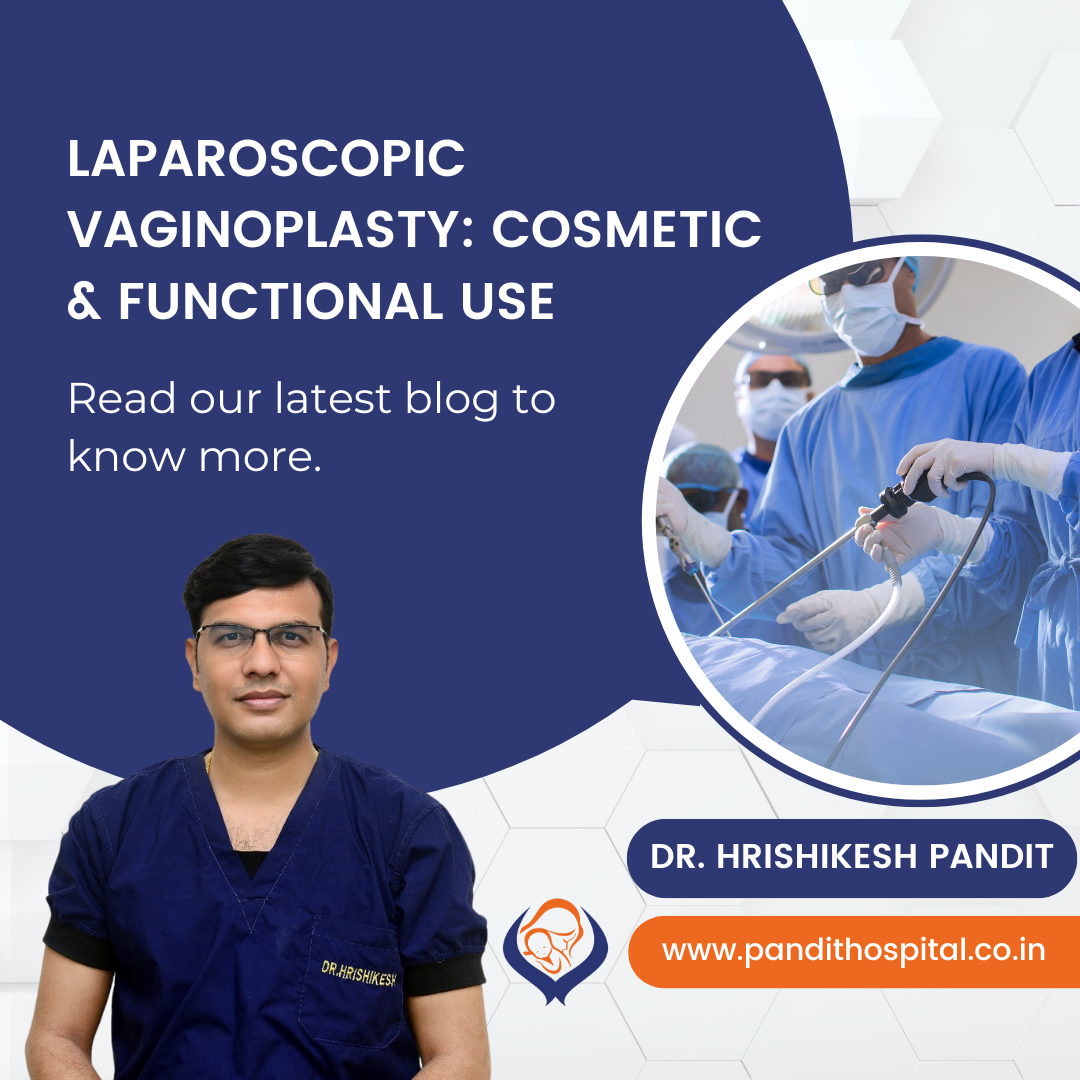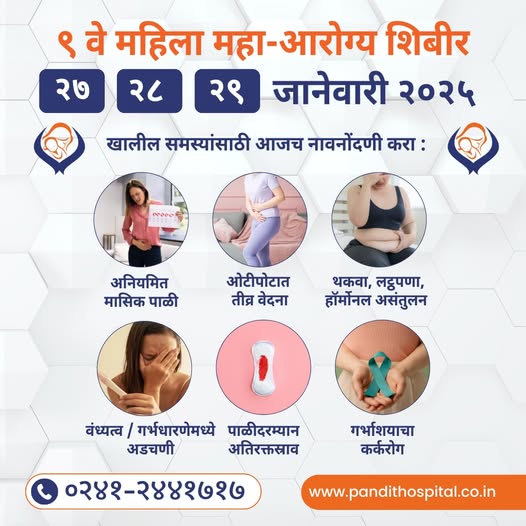Ovarian cysts are a common health issue affecting many women worldwide. At Pandit Hospital, led by the esteemed 3D Laparoscopic Surgeon, Dr. Hrishikesh Pandit, we provide the best ovarian cyst removal services in India. Located in Ahmednagar, Maharashtra, Pandit Hospital is renowned for its advanced gynecological treatments. This blog aims to answer some frequently asked questions about ovarian cysts, including types, symptoms, and treatments.
Read this blog in Marathi
Ovarian cysts are fluid-filled sacs that develop on or inside an ovary. They are quite common and can vary in size and type.
There are several types of ovarian cysts, including:
- Functional Cysts: These are the most common and form during the menstrual cycle. They are usually harmless and often go away on their own.
1) Follicular Cysts: Form when the follicle doesn’t release an egg.
2) Corpus Luteum Cysts: Form after the follicle releases an egg. - Dermoid Cysts: These contain tissues such as hair, skin, or teeth and can grow quite large.
- Cystadenomas: These develop on the surface of an ovary and can be filled with a watery or mucous substance.
- Endometriomas: These are caused by endometriosis, where uterine tissue grows outside the uterus.
Many ovarian cysts are asymptomatic, but some common symptoms can include:
- Pelvic pain, often during the menstrual cycle or during intercourse.
- Bloating or swelling in the abdomen.
- Pain during bowel movements.
- Frequent or painful urination.
- Irregular menstrual periods.
- Unexplained weight gain.
- Severe symptoms like sudden, severe abdominal pain, fever, or vomiting indicate a medical emergency and require immediate attention.
Laparoscopic surgery is a minimally invasive procedure used to remove ovarian cysts. At Pandit Hospital, Dr. Hrishikesh Pandit utilizes 3D laparoscopic techniques for precision and faster recovery. During the procedure, small incisions are made in the abdomen, and a laparoscope (a thin tube with a camera) is inserted to guide the surgery. The cysts are then carefully removed, preserving as much of the ovary as possible.
Yes, non-surgical treatments can be effective, especially for functional cysts. These include:
- Watchful Waiting: Many cysts resolve on their own over time.
- Hormonal Contraceptives: Birth control pills can help prevent the formation of new cysts.
- Pain Management: Over-the-counter pain relievers can alleviate symptoms.
For more complex or persistent cysts, surgical intervention might be necessary.
Ovarian cysts are a common issue with various types, symptoms, and treatments. At Pandit Hospital in Ahmednagar, Maharashtra, Dr. Hrishikesh Pandit, a leading gynecologist in India, offers advanced 3D laparoscopic surgery for effective cyst removal. Whether surgical or non-surgical, personalized treatment plans ensure the best outcomes for patients.
For the best ovarian cyst removal hospital in India, visit Pandit Hospital. Trust us for comprehensive and compassionate care.
For consultation, Contact us today!
At Pandit Hospital, you are in safe hands!
To consult Dr. Hrishikesh Pandit, Click Below,
Pandit Hospital – Best Maternity care center in Ahmednagar
LET’S SEE OUR INTRO VIDEO
At Pandit Hospital, we provide all the maternity services from antenatal to postnatal period under one roof
Let's Connect!!
0241-2441717 / 0241-2442344
About author:
Dr. Hrishikesh Pandit:
Dr. Hrishikesh Pandit is one of the best obstetrician and gynecologist in India. He is also a well-renowned Laparoscopic surgeon. He obtained his MS (Ob Gyn) degree from the prestigious Pravara Institute of Medical Sciences. He has also done fellowship and diploma courses in laparoscopic surgeries and cancer treatment from Tata Hospital and Keil University, Germany. His surgical cases, papers and videos has been chosen in many international forums of gynecology.
At Pandit Hospital, we are always working hard to provide its patients with the highest level of medical innovation and patient care. With the aim of delivering complete maternity & gynecological care under one roof with the help of all contemporary amenities and cutting-edge medical equipment. Dr. Hrishikesh Pandit has a vision to bring the best of facilities regarding laparoscopy surgeries in the city of Ahmednagar. He is the pioneer of 3D Laparoscopy technology is Ahmednagar.
Latest Articles
Dr. Hrishikesh Pandit is one of the best laparoscopy surgeons in India. His determination to bring 3D Laparoscopy technology to Ahmednagar has eventually helped so many patients. Read the latest articles by Dr. Hrishikesh Pandit on Gynecology, gastric issues, and health tips for mothers during pregnancy.
At Pandit Hospital, Ahilyanagar, we provide advanced maternity care with state-of-the-art 3D laparoscopy and sonography services to ensure the safety of both mother and baby.
Pandit Hospital, led by Dr. Hrishikesh Pandit, offers 3D laparoscopic treatments including Laparoscopic Vaginoplasty, to restore both form and function in women seeking vaginal reconstruction in india.
Women’s mega health camp was organized at the Ahilyanagar’s first 3D laparoscopy center in Bhingar under the renowned gynecologist, Dr. Hrishikesh Pandit. Best Health Screening Camp for Women in Ahilyanagar.
FAQ
You should consult a doctor during the first 6 to 8 weeks of your pregnancy, or when your period is 2 to 4 weeks late.
If your contractions are 5 minutes apart, lasting for 1 minute, for 1 hour or longer, it’s time to head to the hospital.
Doctors recommend an infertility evaluation if you have not gotten pregnant after 1 year of having regular sexual intercourse without using birth control. If you are older than 35, an evaluation is recommended after 6 months of trying.
Yes, You can. But most babies need 39 weeks to develop fully. Induced or planned delivery before that time—without a valid medical reason—is not in the best interest of the baby or the mother. After 39 weeks you can plan delivery.
Women who are 21 to 29 should have a Pap test alone every 3 years. HPV testing alone can be considered for women who are 25 to 29, but Pap tests are preferred. Women who are 30 to 65 have three options for testing. They can have a Pap test and an HPV test (co-testing) every 5 years. They can have a Pap test alone every 3 years. Or they can have HPV testing alone every 5 years.
Laparoscopic hysterectomy is a safe and suitable procedure for chosen patients. It affords patients advantages like less peri-operative morbidity, better life quality, shorter hospitalization time, and faster return to activity.
Schedule a doctor’s visit if you have: Greenish, yellowish, thick or cheesy vaginal discharge; Strong vaginal odor; Redness, itching, burning or irritation of your vagina or the area of skin that surrounds the vagina and urethra (vulva); Bleeding or spotting unrelated to your period.
Painless delivery can be achieved using a form of regional anesthesia that provides pain relief during natural labor. Epidural anesthesia is administered through an injection on the lower back of the mother. The drug takes about 10-15 minutes to take effect.
Even in severe cases of endometriosis, most can be treated with laparoscopic surgery. In laparoscopic surgery, your surgeon inserts a slender viewing instrument (laparoscope) through a small incision near your navel and inserts instruments to remove endometrial tissue through another small incision.
The HPV vaccine is recommended for routine vaccination at the age of 11 or 12 years. (Vaccination can be started at age 9.) It is also recommended that vaccination for everyone through age 26 years if not adequately vaccinated when younger. HPV vaccination is given as a series of either two or three doses, depending on age at initial vaccination.





